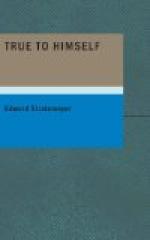Both of my parents were dead to me. My mother died when I was but five years old. She was of a delicate nature, and, strange as it may seem, I am inclined to believe that it was for the best that her death occurred when it did. The reason I believe this is, because she was thus spared the disgrace that came upon our family several years later.
At her death my father was employed as head clerk by the firm of Holland & Mack, wholesale provision merchants of Newville, a thriving city which was but a few miles from Darbyville, a pretty village located on the Pass River.
We occupied a handsome house in the centre of the village. Our family, besides my parents and myself, contained but one other member— my sister Kate, who was several years my senior.
When our beloved mother died, Kate took the management of our home upon her shoulders, and as she had learned, during my mother’s long illness, how everything should be done, our domestic affairs ran smoothly. All this time I attended the Darbyville school, and was laying the foundation for a commercial education, intending at some later day to follow in the footsteps of my father.
Two years passed, and then my father’s manner changed. From being bright and cheerful toward us he became moody and silent. What the cause was I could not guess, and it did not help matters to be told by Duncan Woodward, whose father was also employed by Holland & Mack, that “some folks would soon learn what was what, and no mistake.”
At length the thunderbolt fell. Returning from school one day, I found Kate in tears.
“Oh, Roger!” she burst out. “They say father has stolen money from Holland & Mack, and they have just arrested him for a thief!”
The blow was a terrible one. I was but a boy of fourteen, and the news completely bewildered me. I put on my cap, and together with Kate, took the first horse car to Newville to find out what it all meant.
We found my father in jail, where he had been placed to await the action of the grand jury. It was with difficulty that we obtained permission to see him, and ascertained the facts of the case.
The charge against him was for raising money upon forged cheeks, eight in number, the total amount being nearly twelve thousand dollars. The name of the firm had been forged, and the money collected in New York and Brooklyn. I was not old enough to understand the particulars.
My father protested his innocence, but it was of no avail. The forgery was declared to be his work, and, though it was said that he must have had an accomplice to obtain the money, he was adjudged the guilty party.
“Ten years in the State’s prison.” That was the penalty. My father grew deadly white, while as for me, my very heart seemed to stop beating. Kate fainted, and two days later the doctor announced that she had an attack of brain fever.
Two months dragged slowly by. Then my sister was declared to be out of danger. Next the house was sold over our heads, and we were turned out upon the world, branded as the children of a thief, to get a living as best we could.




